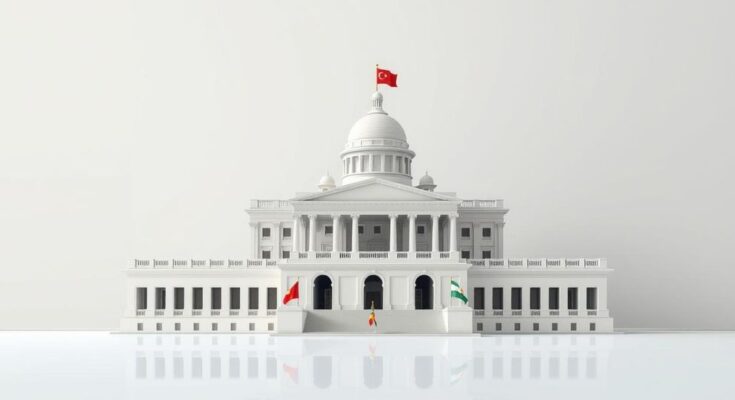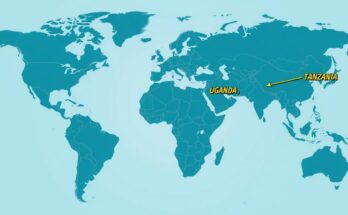A senior US envoy in Beirut warned against Hezbollah’s presence in Lebanon’s new government, declaring the Iran-backed group ‘defeated’ by Israel. This statement received backlash from Hezbollah, which criticized the US comments as interference. Ortagus called for an end to Hezbollah’s influence and for Lebanon to undertake reforms amidst ongoing political tensions and economic struggles.
A senior US official in Beirut emphasized the necessity of excluding Hezbollah from Lebanon’s new government, labeling the Iran-backed group as “defeated” in its conflict with Israel. This statement was met with criticism from Hezbollah, which termed the remarks by US Deputy Special Envoy Morgan Ortagus as “blatant interference” in Lebanese affairs. Ortagus asserted, “We have set clear red lines in the United States that they (Hezbollah) won’t be able to terrorise the Lebanese people…”,” after a meeting with President Joseph Aoun.
Hezbollah has faced significant challenges, losing much of its leadership and military capabilities in recent conflicts. The US government’s support is seen in the election of Aoun, recognized as Washington’s preferred candidate, and the appointment of Nawaf Salam as the new premier after years of political stagnation. Ortagus further asserted that Hezbollah’s “reign of terror” has ended, thanking Israel for its role in defeating the group.
In response to Ortagus’s comments, President Aoun’s office clarified that some of her statements reflect her personal views, not the presidency’s position. Hezbollah’s parliamentary leader, Mohammed Raad, criticized the US remarks as irresponsible and a violation of Lebanon’s sovereignty. This added to the contentious atmosphere surrounding Hezbollah’s involvement in Lebanese politics.
Ortagus’s visit marks her first official trip abroad since taking office, during which she highlighted the urgency for Lebanon to enact reforms to combat corruption, and diminish Hezbollah’s influence. Prime Minister-designate Nawaf Salam aims to form a government that excludes members of political parties and potential election candidates, focusing on preventing any obstruction of governmental processes.
Political distribution in Lebanon traditionally follows sectarian lines, with Hezbollah and its ally enforcing control over Shiite ministries in the proposed cabinet. Salam has resisted these demands, aiming to end the political deadlock that previously left Lebanon without a president for over two years.
Besides addressing political issues, Salam reiterated the importance of adhering to a UN resolution calling for Israel’s withdrawal from Lebanon and ensuring Lebanese military and UN peacekeepers are the only forces in the south. Following discussions with Ortagus, Aoun stated that consultations to finalize a new government are close to completion while reiterating calls for Israel’s withdrawal.
As part of a broader agreement, there was a commitment to a ceasefire arrangement encouraging Lebanon’s military deployment southward as Israel withdrew within an established timeline, although both sides have accused one another of violations. Ortagus affirmed that the United States remains committed to the newly revised deadline for withdrawal.
The comments from US Deputy Special Envoy Morgan Ortagus come amid ongoing political challenges in Lebanon as the country attempts to form a new government amidst Hezbollah’s influential, and often controversial, presence. The historical backdrop involves Hezbollah’s long-standing role in Lebanese politics, its conflict with Israel, and the resulting implications for Lebanese sovereignty and governance. The US has sought to counteract Hezbollah’s influence, advocating for reforms within Lebanon that would limit the group’s power and facilitate international support due to longstanding economic difficulties. Recently, political power-play dynamics have been shaped significantly by the aftermath of violent conflicts and external pressures. Furthermore, the geopolitical landscape is characterized by Hezbollah’s historical dependence on Iran and its contentious relationships with both local and international political actors, which complicates the country’s ability to instigate reforms or progress towards improved governance under external mandates. As Lebanon grapples with issues such as corruption, sectarian division, and economic crises, such statements from US officials have initiated heated political discourse within the country.
In conclusion, US Deputy Special Envoy Morgan Ortagus’s statement emphasizing the exclusion of Hezbollah from Lebanon’s government reflects broader US policy aimed at limiting Iranian influence in the region. Hezbollah’s reaction demonstrates ongoing tensions regarding its role in Lebanese politics while grappling with significant losses due to recent conflicts. As Lebanon’s newly-elected leaders navigate the political landscape filled with challenges and demands for reform, the implications of these developments will significantly impact the country’s future political stability and governance.
Original Source: www.themountainpress.com




